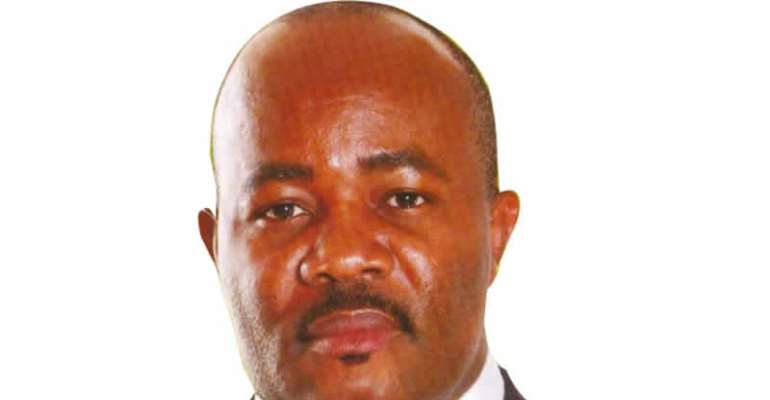Gov. Godswill Akpabio Sets to Borrow Money Again

Sources say Godswill Akpabio has perfected plans to approach the capital market to borrow funds to support his ongoing spending habits. Barring any unforeseen circumstances, very soon (probably before the end of this week) Akpabio is set to present to the Akwa Ibom State House of Assembly a loan package for approval before tendering it to the Nigerian Security and Exchange Commission. It is not quite clear how much Akpabio plans to obtain but speculations are that it will not be less than N50 billion (fifty billion naira).
This would neither be the first nor the second time that Akpabio would borrow money. For instance, on December 18, 2011, delivering a keynote address at the maiden retreat of the Security and Exchange Commission, Akpabio hinted that he would borrow funds to “actualize some very important projects of government aimed at transforming the state into the economic hub of not just Nigeria, but the Gulf of Guinea.”
In his speech at the maiden retreat, which was titled “Transformational Leadership in the Actualization of the Vision 2020: The case of Akwa Ibom State,” Akpabio told the audience that the funds would be used to increase the capacity of Ibom Power Plant from what at that time was 195mw to 500 megawatts. He enumerated that the funds will also be used to enhance Ibom Industrial City at Ibaka.
To support Akpabio's reasoning for seeking the loan, Mrs. Arunma Otteh, who was the Director General of Securities and Exchange Commission at the time, praised Akpabio's decision to apply for the loan and described what Akpabio does in Akwa Ibom State as “magical.”
Few months after the speech, Akwa Ibom State House of Assembly approved a loan package for N150 billion.
The Ibom Power Plant is still stagnant at the same level of 195 mw it was before Akpabio borrowed the money and available sources indicate that actually, the capacity to generate electricity in the state may have fallen. And the Ibom Industrial City Park has not left the drawing board, assuming it was ever on board.
But is Akwa Ibom State so poor that Akpabio has to frequently borrow money from other sources to finance projects? According to reports from the Federal Ministry of Finance, between March 2011 and March 2012 (one calendar year) Akwa Ibom State received more than N282 billion (to be exact, N282, 145, 820, 155) from federal allocations: the only state in the nation with the highest receipt. And in March 2013, the Federal Government of Nigeria released a report, which showed that between 2008 and 2012 (5 years), the administration of Godswill Akpabio has received more than one trillion naira, or N1, 052, 686, 157, 699.17 (Source:http://www.fmf.gov.ng/) from federation account. This figure indicates the Net Statutory and Value Added Tax (VAT) allocations for Akwa Ibom State; it does not include internally generated revenue.
In his comment on the receipts, Chief Mark Etuk in Los Angeles wrote: “The State coffer does not reflect on the wellbeing of the people. There is abject poverty in the land of Akwa Abasi Ibom (Akwa Ibom State---in brackets mine). People go to bed with empty stomachs and are not sure they will have food on the table for their families the next day. (There are) high numbers of unemployed youths in the state; some are allured to take to crimes. Teachers do not receive their pay regularly. People are insecure and poor and they are afraid to stay in their homes. Senseless political killings and kidnappings continue to reign because the perpetrators are not apprehended and punished. Dilapidated school structures dot the land and pipe-borne water, even in the state capital Uyo, is dry. The policy initiatives of the government, with the sound-bite of “uncommon transformation,” do not have any impact on the well-being of the people of the state. The government is not accountable to the people.”
Besides accountability, many worry about the long-term effect of borrowing. Some analysts say by the time Akpabio leaves the office, Akwa Ibom State will be engulfed in debts so much that it will take generations to get out of it. What will happen is that paying and servicing the debt will hinder the administration that will succeed Akpabio's from meeting its financial obligations, because servicing and paying the debts will take away the money which would be need to develop and run several social programs for the people.
Many are asking: How can Akwa Ibom State get away from this madness?
Ikpafak Thompson Essien, a political analyst writes from Portland, Oregon
